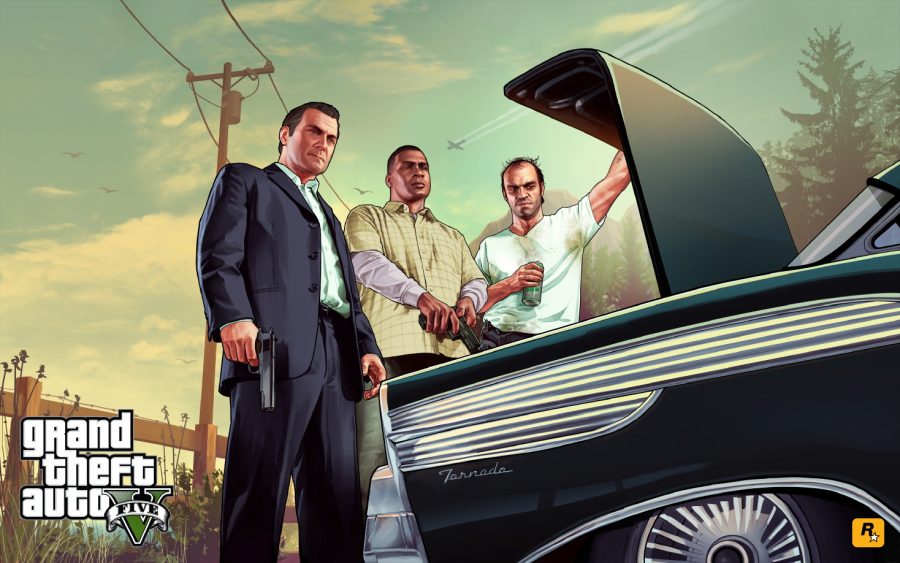Grand Theft Auto V (GTAV) was released last Tuesday to rapturous fanfare. The hotly anticipated latest installment in Rockstar Games’ Grand Theft Auto series was greeted with critical acclaim and over 800 million dollars in sales within 24 hours of launch. Three days after its release, sales of GTAV passed the 1 billion dollar mark. Forbes reports that GTAV’s launch is the most successful in entertainment history, meaning that GTAV has outperformed the release of every book, play, album, movie and video game ever created by human hands. Suffice to say, GTAV is a big deal.
Predictably, the media has wasted no time in milking GTAV’s explosive appeal and controversial content. It’s early yet, but pundits on television are already playing on parents’ fears by making alarming claims about the brutality and violence present in the game. This kind of sensationalism is nothing new; Grand Theft Auto IV drew the same criticisms from the same sources when it came out in 2008. I fully anticipated that GTAV would get flak and incite calls for censorship because of its violent content, but despite all my preparedness I still wasn’t ready for the Association of Teachers and Lecturers.
The Association of Teachers and Lecturers is a teacher’s union in the UK with over 160,000 members. The union’s co-president, Alison Sherratt, was interviewed by Martin Bagot of The Daily Mirror, a British tabloid. In her interview, Sherratt lays out one of the most fascinatingly bad critiques of a piece of media I’ve ever read.
Sherratt’s basic argument is nothing new. She claims that children are going to play GTAV, be unable to understand that what’s happening onscreen is fictional and then go out to commit violent acts in real life. The Mirror’s writer, Mr. Bagot, helpfully points out in his article that scientific research has found absolutely no link between youth violence and the video games they play, but Ms. Sherratt has some anecdotal interview research her union conducted that she claims shows that violent video games are causing violent behavior in primary school-aged children.
Okay, I’ll admit I disagree with Ms. Sherratt, but I’ll give her a chance. I should at least find out what violent behavior she’s observing in children before passing judgment. So what are these heinous acts of violence that her interview research has proven Grand Theft Auto causes? Sherratt provides only one example of “violence” in the entirety of her interview: “We’ve had children crashing into others in toy cars in the playground.” Oh the humanity! How shocking! Children never bumped into each other in toy cars before those depraved, unchaste, saturnalian video games corroded their fragile little minds! For the president of a teacher’s union, Sherratt knows remarkably little about children. I remember that happening all the time when I was a kid, and neither I nor any of my six-year-old friends had ever heard of Grand Theft Auto.
Sherratt also said that when children were asked by the union if they’d had experience with GTAV, “they say they have been watching Grand Theft Auto. They are quite open about it.” I’m at a loss. “Watching Grand Theft Auto?” Does she even know what video games are? If you’re going to fly in the face of scientific research and claim that video games cause real-world violence you should at least have a basic comprehension of how they work.
Alison Sherratt and the Association of Teachers and Lecturers are just one dazzlingly ignorant float in a much larger and more dangerous media parade. It happens every time a popular violent game is released. Dowdy old commentators and self-righteous political figures whose experience with games is limited to Angry Birds come crawling out the woodwork wailing, “Won’t somebody think of the children?” It’s tempting to dismiss these people, but the trouble is they have real political sway.
The Australian Classification Board forced Saints Row IV, a game similar to GTAV in a lot of ways, to be censored heavily before allowing it to be sold to adults. People like Alison Sherratt are persuading western governments to engage in barefaced, unconcealed censorship of creative works. The situation is beyond outrageous.
It’s a shame really. In all the manufactured controversy the creative and technological brilliance of Grand Theft Auto V risks being lost. The game is packed with astonishingly poignant social commentary on post-recession America; putting celebrities, the millennial generation, the media, the rich, the poor, the political right and the political left under a microscope. There is real and undeniable artistic merit in Grand Theft Auto V, but because it depicts violence and because it’s popular, GTAV, like its predecessors, is doomed to be a straw man that censorship apologists turn to for years to come.















































































































Kyle • Oct 14, 2013 at 5:36 pm
I don’t understand how people don’t see that the GTA series is a critique on modern culture in which nobody is exempt from the hate and satire. It’s a phenomenal artistic statement that’s just completely misunderstood by many who have never actually played the game.